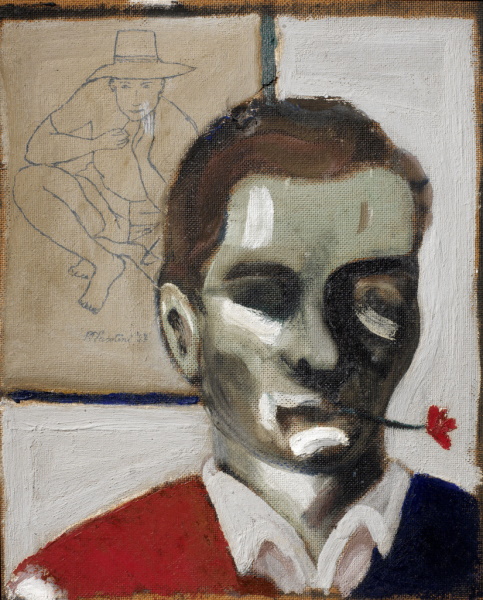In the afternoon of Saturday, November 1, 1975, journalist Furio Colombo was interviewing Pier Paolo Pasolini. Answering the last question, Pasolini said:
“I don’t want to talk anymore about myself, maybe I have already said too much. Everybody knows that, as a person, I do pay for what I say. But there are also my books and my films that end up paying for me. Maybe I’m wrong after all, but I keep on thinking that we are all in danger.”
And that last bit, “we are all in danger,” ended up being the title of the interview, at Pasolini’s own suggestion. When asked to elaborate, he said “You do not even know who, in this very moment, is thinking about killing you.”
Only a few hours later, in the early morning hours of November 2, 1975, Pier Paolo Pasolini was dead. Brutally killed in still unresolved ways. Perhaps it is the haunting echo of these last public words of his that carry the weight of his life and work best, and continue to do so to this day.
Pier Paolo Pasolini was many things: writer, film director, teacher, linguist, actor, politician, novelist, painter, journalist, poet, playwright, political figure. He was the opposite of “the quiet guy” – during his lifetime, he went to court 33 times because of his art or his opinions. He criticized religion, the state, the Christian Democratic Party, consumption, television and censorship. He was himself criticized also, for being a homosexual, for expressing himself in “obscene” ways, for not mincing words, for not being subtle at all in making a point.
A matter of fact remains: despite all the controversy, Pier Paolo Pasolini was one of Italy’s greatest scholars. His curiosity never stopped branching out to all spheres of cultural, intellectual, political and social life. His rich, diverse legacy prevails, as an important part of the 20th century Italian milieu.

Pier Paolo Pasolini – Master of Controversy
It is hard to put 53 years of history of someone like Pier Paolo Pasolini into a fairly short article like this one. His work was always closely linked to the events in his life, as he went to leave a mark all over Italy, but also the world.
Pasolini began writing poems at age seven, inspired by the natural beauty of his mother’s hometown, Casarsa. His father was a lieutenant in the Royal Italian Army, so the family moved around northern Italy a lot. He studied in Bologna, where he was born. There, his interest in poetry, but also language, figurative arts, literature readings, and photography expanded significantly. Upon the end of World War II, Pasolini co-founded the Friulian Language Academy, an initiative aiming to preserve the Friulano (Friulian) dialect.
After moving to Rome in the 1950s, Pasolini began directing films. Many consider this to be a turning point in his artistic career; his visions of the world remained the same, yet they were now expressed in a new, clearer, more direct “language of reality.” Pasolini’s movies offered takes on religion, politics, sexuality, capitalism, causing scandal at every turn. Through clever allegory and metaphor, he offered new forms of visual storytelling, interwoven with anger and desire. Many consider Pasolini’s final film, “Salò” (“Salò, or the 120 Days of Sodom”, 1975), to be his most controversial, with explicit scenes of sadistic violence, among other things.
Pasolini’s sexuality was one of the more important aspects of his life. He was openly homosexual, often casting his love interests in his films and/or mentoring them for years. His depictions of the erotic male body are prominent in films like Teorema (1968), The Decameron (1971), The Canterbury Tales (1972), and Arabian Nights (1974). An encounter with an underage male prostitute, Giuseppe (Pino) Pelosi, ultimately led to his death.
Pier Paolo Pasolini was assassinated on the beach in Ostia, a small town close to Rome. His body was disfigured from violence. Pelosi, who was caught driving Pasolini’s car, confessed to the murder. In 2005 however, he retracted his confession, saying he was threatened to take the blame. Almost five decades after Pasolini’s death, many believe the alternative story: that he was murdered by someone else, possibly the mafia, the people who stole the negative of his last movie and wanted ransom, or some other entity that didn’t like his loud, unapologetic voice.
Because not only was Pier Paolo Pasolini an openly gay man, he was also an unaligned leftist willing to call out the fascist government and their criminal ties, or to question suspicious murders of politicians. His bravery, complex personality, as well as the uncanny predictions of our own society today, earned him respect and admiration beyond any generational boundaries.

The Centenary Celebrations
To mark the centenary of Pier Paolo Pasolini’s birth throughout 2022, institutions across Il Belpaese are hosting a variety of events.
Pasolini’s hometown of Bologna is hosting a yearlong array of events (1 March – 16 October, 2022), titled “Folgorazioni figurative.” Aside from conferences and book releases, what’s perhaps most interesting is the guided tours, as well as the projections of all of Pasolini’s beloved movies at Cinema Lumière. #QuiPasolini offers ten site-specific installations honoring places significant to Pasolini. Among them, there is Stadio Dall’Ara (Pasolini was a big football fan), as well as Liberia Nanni, where he discovered his passion for literature.
Casarsa della Delizia, where Pasolini spent his childhood summers and war years, is home to the Centro Studi Pasolini. This year, it reopened with a new layout, telling Pasolini’s story through original furnishings and documents, family photos, rare editions, and letters. On display are Pasolini’s poetry books, photos from his childhood, as well as 25 of his paintings and photographs of Bolognese footballers from his bedroom walls.
In Rome, three big institutions are organizing a grand exhibition, titled “TUTTO È SANTO” (Everything is holy). From 28 October 2022 to 13 February 2023, Palazzo delle Esposizioni, Palazzo Barberini and the MAXXI Museum will host the in-depth study of Pasolini’s life and work. There will also be a reading of Pasolini’s work conducted by contemporary artists.
At the Roman Galleria d’Arte Moderna, between 14 October 2022 and 16 April 2023, an exhibition will focus on Pasolini the painter. It will be an exclusive look at about 200 artworks, ranging from paintings to drawings of people, still life, and nature.

